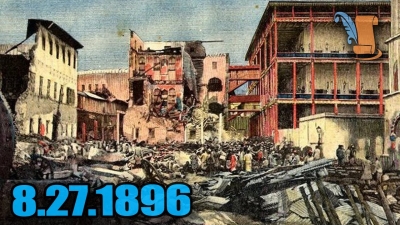
Lasting between 38 and 45 minutes, the Anglo-Zanzibar War of 1896 was recorded as the shortest war in history. It was an armed conflict between the U.K. and the Zanzibar Sultanate. The island of Zanzibar was a British protectorate. Following the unexpected death of the pro-British Sultan Hamad bin Thuwaini on August 25, 1896, his cousin Khalid bin Barghash ascended the throne without the consent of the British Angered, the British served an ultimatum on Khalid to leave the palace. As Khalid refused to obey, the conflict broke out on August 27 at about 9.02 a.m. and within minutes, the palace was bombarded. Over 500 Zanzibari soldiers died. Khalid escaped. One British soldier was wounded. The same day, the pro-British Hamud bin Mohammed was named Sultan.
At exactly 09:00, General Lloyd Mathews ordered the British ships to commence the bombardment. At 09:02 Her Majesty’s Ships Racoon, Thrush and Sparrow opened fire at the palace simultaneously. Thrush’s first shot immediately dismounted an Arab 12-pounder cannon. Three thousand defenders, servants and slaves were present in the largely wooden palace, and even with barricades of crates, bales and rubber, there were many casualties from the high explosive shells. Despite initial reports that he had been captured and was to be exiled to India, Sultan Khalid escaped from the palace. A Reuters news correspondent reported that the sultan had “fled at the first shot with all the leading Arabs, who left their slaves and followers to carry on the fighting”, but other sources state that he remained in the palace for longer. The shelling ceased at around 09:40, by which time the palace and attached harem had caught fire, the Sultan’s artillery had been silenced and his flag cut down.
During the bombardment a small naval engagement occurred when, at 09:05, the obsolete Glasgow fired upon the St George using her armament of 7 nine-pounder guns and a Gatling gun, which had been a present from Queen Victoria to the sultan. The return fire caused Glasgow to sink, though the shallow harbour meant that her masts remained out of the water. Glasgow’s crew hoisted a British flag as a token of their surrender, and they were all rescued by British sailors in launches. Thrush also sank two steam launches whose Zanzibari crews shot at her with rifles. Some land fighting occurred when Khalid’s men fired on Raikes’ askaris, with little effect, as they approached the palace. The fighting ceased with the end of the shelling. The British controlled the town and the palace, and by the afternoon Hamoud bin Muhammed, an Arab favourable to the British, had been installed as sultan with much reduced powers. The British ships and crews had fired around 500 shells, 4,100 machine gun rounds and 1,000 rifle rounds during the engagement.
Credit : Wikipedia
PictureCredit : Google




